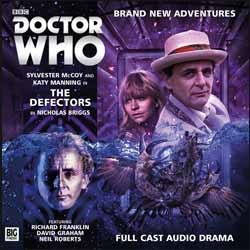|
Click here to return to the main site. Audio Drama Review
Jo Grant is shocked to find that most of her colleagues are missing. Then she discovers that the Doctor has inexplicably changed. But there’s little time to worry about it, as she and her misplaced Time Lord friend are whisked off to the mysterious Delphin Isle on a matter of national security. There, they encounter a disturbingly odd form of local hospitality and learn of a highly classified incident that took place during the Cold War. Why exactly have they been brought here? And what is the truth concerning the bodies in the harbour and the vast project being undertaken beneath a cloak of secrecy…? I love it when licensed Who fiction plays mix and match with characters from different periods of the show – be it the Sixth Doctor seeking out Jamie, or Sarah Jane accompanying the Seventh Doctor in the Doctor Who Magazine comic strip; UNIT getting help from Ian and Barbara in the absence of the Third Doctor in the novel The Face of the Enemy, or from the Fifth Doctor, Tegan and Turlough in Deep Blue; or Jamie and Charley both crossing paths with the Sixth Doctor in the Big Finish main range. Therefore, I’m delighted by the notion of Big Finish’s “Locum Doctors” trilogy, especially since it gives us a chance to explore the eras of the first three Doctors, whose audio adventures are thinner on the ground than those of their successors. It’s all the idea of main range script editor Alan Barnes. “For some time, I’d been thinking it was a shame we couldn’t make more use of the first three Doctors’ companions in the main range,” says Barnes. “Continuity permitting (or even not!), we can always have the Fifth, Sixth or Seventh Doctors meeting up with friends they said goodbye to years before… but there have been a fair few School Reunion-type stories now, and they’re great, but I couldn’t help wondering: can’t we do something different? Then I thought: what if the Fifth, Sixth and Seventh Doctors turned up bang in the middle of earlier, unseen adventures – standing in for their ‘proper’ selves, who’ve gone AWOL for some reason or other…? Locum Doctors, if you will!” This opening tale sees the Seventh Doctor showing up, for reasons unknown, during the time of the Third Doctor, at some point between The Three Doctors and The Green Death, and meeting Jo Grant (Katy Manning). It helps that Jo has encountered other incarnations of the Time Lord before (in The Three Doctors) – the story might have got bogged down if Jo had been as confused about who the new Doctor was as the Doctor himself was about why he had been displaced in time. She still treats this interloper with a healthy dose of scepticism, though, wanting ‘her’ Doctor back. “The challenge,” according to writer / director Nicholas Briggs, “is to put your displaced Doctor into an adventure which feels like it comes from another era, and he has to work out why he’s here and what he’s supposed to do. It brings up lots of questions about what makes the Doctors different.” In the case of the Third and Seventh Doctors, they are both very sure of themselves, but in very different ways: the Third quite openly, the Seventh more secretively. Both are known for expressing their distaste for military action, be it addressed to the Brigadier or to Group Captain Gilmore. Despite such similarities, the Seventh Doctor’s solution to the problem he faces here seems set to differ substantially from anything the Third might ever have contemplated, and it is Jo’s actions that keep the outcome true to the Jon Pertwee era. The fact that certain characters fail to notice the Doctor’s change of appearance also becomes a pertinent part of the mystery. Mike Yates (played by Richard Franklin, the only other available survivor from the regular cast of the Pertwee period) appears in just a few scenes, which is a pity, but it does allow for more one-on-one interaction between the Doctor and Jo. The sound design on this release plays a big part in fusing the two eras. Each episode opens and closes with the 1970s theme, but the incidental music, by Joe Kramer, manages to blend the electronic burbles of Dudley Simpson with the military-style percussion of Mark Ayres. The voices of the aliens have a typically late 1960s / early 1970s modulation applied to them (a la The Invasion and The Ambassadors of Death), but the delivery (by Rachel Bavidge and Jez Fielder) is a mixture of creepy and comical of the kind you might hear in Ghost Light. The reason for the Doctor’s temporal displacement is not explained in The Defectors – that, I guess, will be revealed in a later part of the trilogy. However, the understated nature of the mystery means that this adventure stands up well on its own, rather like a Doctor Who version of an episode of Quantum Leap. The next release sees the Sixth Doctor on a collision course with the era of the Second Doctor, which, as indicated at the top of this review, has happened quite a few times already. Nevertheless, I’m rather looking forward to it, as Jon Pertwee once said. Oh, boy…! 8 Richard McGinlay Buy this item online
|
|---|

